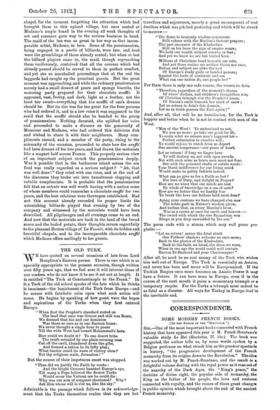THE OLD TURK.
WE have quoted on several occasions of late from Lord Houghton's Eastern poems. There is one which is so specially appropriate to the present occasion, though written over fifty years ago, that we feel sure it will interest those of our readers who do not know it to see it set out at length. It is entitled "The Turk at Constantinople to the Frank." In it a Turk of the old school speaks of the fate which he thinks is imminent—the banishment of the Turk from Europe—and be muses with fatalistic calm upon what such action will mean. He begins by speaking of how great were the hopes and aspirations of the Turks when they first entered Europe.
"When first the Prophet's standard rested on
The land that once was Greece and still was Rome, We deemed that his and our dominion Was there as sure as in our Eastern home: We never thought a single hour to pause
Till the wide West had owned Mohammed's laws.
How could we doubt it ? To one desert tribe
The truth revealed by one plain-seeming man Cut off the cavil, thundered down the gibe, And formed a nation to its lofty plan; What barrier could its wave of victory stem? Not thy religious walls, Jerusalem ! "
But the course of their impetuous onset was stopped.
"Thus did we justify the Faith by works : And the bright Crescent haunted Europe's eye, Till many a Pope believed the demon Turks Would scour the Vatican ere he could die : Why was our arm of conquest shortened P Why ? Ask Him whose will is o'er us, like the sky."
Admirable is the passage which follows in its acknowledge- ment that the Turks themselves realize that they are but travellers and sojourners, merely a great encampment of tent dwellers which was pitched yesterday and which will be struck to-morrow:— " The dome to heavenly wisdom consecrate
Still echoes with the Muslim's fervent prayers ; The just successor of the Khaleefate Still on his brow the sign of empire wears ; We hold our wealth without reserve or fear; And yet we know we are but tented here.
Millions of Christians bend beneath our rule, And yet these realms are neither theirs nor ours, Sultan and subject are alike the tool Of Europe's ready guile or banded powers ; Against the lords of continent and sea What can one nation do, one people be ? "
For them there is only one safe course, the return to Asia.
"Therefore, regardless of the moment's shame, Of wives' disdain, and children's thoughtless woe, Of Christian triumph o'er the Prophet's name, Of Russia's smile beneath her mask of snow : Let us return to Asia's fair domain, Let us in truth possess the East again !"
And, after all, that will be no humiliation, for the Turk is happier and better when he is not in contact with men of the
West. "Men of the West ! Ye understand us not, We you no more: ye take our good for ill;
Ye scorn what we esteem man's happiest lot—
Perfect submission to creative will ; Ye would rejoice to watch from us depart Our ancient temperance—our peace of heart.
Let us return! if long we linger hero Ye will destroy us, not with open swords, Not with such arms as brave men must not fear, But with the poisoned shafts of subtle words : Your blank indifference for our living creed Would make us paltry Infidels indeed.
What can ye give us for a Faith so lost?
For love of Duty, and delight in Prayer? How are we wiser that our minds are test
By winds of knowledge on a sea of care? How are we better that we hardly fear
To break the laws our fathers held most dear?
Aping your customs we have changed e'en now The noble garb in Nature's wisdom given, And turban that, on every Muslim's brow, Was as a crown at once for earth and heaven :- The sword with which the sire Byzantium won Sleeps in yon deep unwielded by the son."
The poem ends with a stanza which may well prove pre- phetic
"Let us return! across the fatal strait Our Fathers' shadows welcome us once more
Back to the glories of the Khaleefate, Back to the faith we loved, the dress we wore, When in one age the world could well contain Hereon Er-Rasheed and your Charlemagne !"
After all, he need be no real enemy of the Turk who wishes him well out of Europe. The Turk is essentially an Asiatic. and never has been and never will be Europeanized. If the Turkish Empire once more becomes an Asiatic Power it may have a future. It can have none in Europe, even if in the course of the next month it gains a momentary triumph or a temporary respite. For the Turks a triumph must indeed be as fatal as a disaster. All ways for Turkey in Europe lead to the inevitable end.


















































 Previous page
Previous page